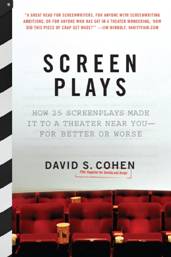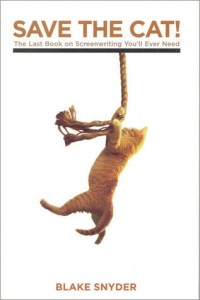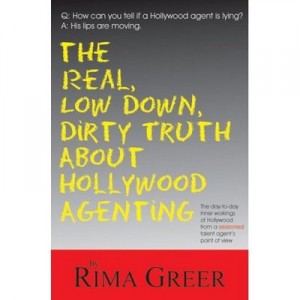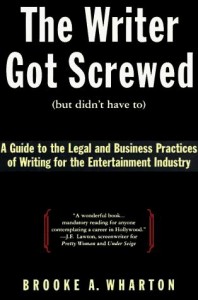

Four Books You Should Have on Your Shelf
January 26th, 2014
by Zachary Hollwedel
There are no fewer than three million, seven hundred fifty thousand, and eighty three books on screenwriting. And I'm not counting those published since 2010. At least, that's how it feels. It's as if anyone who has ever watched a movie believes him or herself qualified to write a screenwriting how-to book. After all, that's got to be a heck of a lot easier than actually writing a screenplay that sells, doesn't it? I'm not a huge believer in screenwriting guide books. I'll be brutally honest about that fact. For the most part, they seem one and the same to me. More than that, though, I went through a four year BFA program in screenwriting, so I like to think that I don't need whatever pearls of wisdom someone who wrote Revenge of the Suburban Ax Murderer 7 for direct-to-tv back in 1983 has to dispense. That said, I'll also not lie about the fact that there are a few books I do actually turn to for advice. Whether you're a brand new writer just looking for some preliminary guidance, someone with a good ten or twelve scripts under your belt but no sales yet, or someone with produced and possibly even recognizable titles, here are my four suggestions for books that are worth your time (and money) reading.
1. SCREEN PLAYS by David S. Cohen  I genuinely enjoyed this book, in which Cohen explores the paths that 25 relatively recent films (from the mega-blockbuster Gladiator to the largely unknown The Caveman's Valentine) took in getting from script to screen. Especially if you haven't begun writing yet, or you've written scripts but are struggling with the ever-present question, why won't this sell already???, Screen Plays is worth a read. Though some of the tales told in it - all true, by the way - might be depressing to us professional scribe hopefuls, the overall piece should be viewed as encouragement. Screenwriting is not only hard, it's a hard business. By providing such a detailed look at 25 very different projects from as many, if not more very different writers, Cohen offers us all guidance, instruction, and hope that our material will sell. Whether it takes ten weeks or ten years, and whether we're fired on day one or stand up to accept the Oscar (or both), the options are endless for a working writer. Screen Plays reminds us of that and, more importantly, reinforces that no matter how tough an uphill battle nabbing that first sale will be, even the greatest achievements in screenwriting have been born of the utmost patience, care, and resilience.
I genuinely enjoyed this book, in which Cohen explores the paths that 25 relatively recent films (from the mega-blockbuster Gladiator to the largely unknown The Caveman's Valentine) took in getting from script to screen. Especially if you haven't begun writing yet, or you've written scripts but are struggling with the ever-present question, why won't this sell already???, Screen Plays is worth a read. Though some of the tales told in it - all true, by the way - might be depressing to us professional scribe hopefuls, the overall piece should be viewed as encouragement. Screenwriting is not only hard, it's a hard business. By providing such a detailed look at 25 very different projects from as many, if not more very different writers, Cohen offers us all guidance, instruction, and hope that our material will sell. Whether it takes ten weeks or ten years, and whether we're fired on day one or stand up to accept the Oscar (or both), the options are endless for a working writer. Screen Plays reminds us of that and, more importantly, reinforces that no matter how tough an uphill battle nabbing that first sale will be, even the greatest achievements in screenwriting have been born of the utmost patience, care, and resilience.
2. SAVE THE CAT! by Blake Snyder  Now that you're up to speed on what actually getting a movie made entails and you've decided you still want to take a crack at it, Save the Cat is where I direct you for your writing tutorial. Snyder's book is a quick but very enlightening book, which presents some interesting ideas on what a writer should know about his/her idea before writing, during writing, and after writing. Whereas many books deal with the technicalities of format and presentation (and that is all incredibly important to know), Save the Cat explores pre-writing primarily. I don't think I can stress the importance of pre-writing enough. So often, writers just start on page one and see where the story goes from there. I used to do this all the time; I liked "being surprised" by it. Truth is, that doesn't work (and if it truly does work for you, then I bow down before you). Pre-writing - planning, outlining, determining your story's themes and your characters' backstories - is not only helpful to the actual script writing process, but it is essential to it. Snyder makes his readers do a lot of introductory exercises before they even get to type that first FADE IN, and I think they are all the better off for it. I don't agree one hundred percent with everything he says (I've begun and finished many a script without a solid title in place without any detriment to the story itself), but I'd be dishonest if I told you that I didn't recently glean anything from this book. I was a bit stuck on an outline, and my manager suggested I give Save the Cat a read. I did, and was done with the outline less than a week later. Snyder's approach to working out the kinks in a story has changed the way I look at my structures and outlines, and I think it will for any reader, no matter how accomplished or prolific he or she might be. Sometimes, a friendly reminder of the basics can go a long way.
Now that you're up to speed on what actually getting a movie made entails and you've decided you still want to take a crack at it, Save the Cat is where I direct you for your writing tutorial. Snyder's book is a quick but very enlightening book, which presents some interesting ideas on what a writer should know about his/her idea before writing, during writing, and after writing. Whereas many books deal with the technicalities of format and presentation (and that is all incredibly important to know), Save the Cat explores pre-writing primarily. I don't think I can stress the importance of pre-writing enough. So often, writers just start on page one and see where the story goes from there. I used to do this all the time; I liked "being surprised" by it. Truth is, that doesn't work (and if it truly does work for you, then I bow down before you). Pre-writing - planning, outlining, determining your story's themes and your characters' backstories - is not only helpful to the actual script writing process, but it is essential to it. Snyder makes his readers do a lot of introductory exercises before they even get to type that first FADE IN, and I think they are all the better off for it. I don't agree one hundred percent with everything he says (I've begun and finished many a script without a solid title in place without any detriment to the story itself), but I'd be dishonest if I told you that I didn't recently glean anything from this book. I was a bit stuck on an outline, and my manager suggested I give Save the Cat a read. I did, and was done with the outline less than a week later. Snyder's approach to working out the kinks in a story has changed the way I look at my structures and outlines, and I think it will for any reader, no matter how accomplished or prolific he or she might be. Sometimes, a friendly reminder of the basics can go a long way.
3. THE REAL, LOW DOWN, DIRTY TRUTH ABOUT HOLLYWOOD AGENTING by Rima Greer  The script is done. Your friends love it. Your mother genuinely loves it and isn't just saying that because she has to. Everyone who has read it thinks it's ready for the big screen, and you do, too. So what does that mean? It's time to look for an agent. Before you do that, though, read Greer's book. At 176 pages, it's foolish not to take a weekend to do so. Greer, and agent at Above the Line Agency, packs a lot into this tiny package. Not only does she cover a plethora of questions about agents versus managers versus lawyers, about how to get an agent, how to hold onto an agent, or why you might not be catching agents' interest, but she addresses what it means for an agent to make a sale for you. This is vital information. Greer walks her reader through the multi-tiered sale process, touching on who has to read and like your script (so many people, that it's almost easier to ask, "who doesn't?"), how a sale can come together or fall apart, and what contract negotiations are like. There are likely to be more questions asked in this book than you sought to have answered, and it's all invaluable information. After I read it, I realized that there was so much information I wasn't even thinking to consider, but Greer not only brought it up, she answered it for me. Screenwriting is a business, and a writer is his or her own CEO in it. The less you know, the more susceptible you are to loss of ideas, income, and face. Greer presents a very comprehensive guide to understanding this world, and along with that, an insider's look into what agents do for us writers and why maintaining that relationship is as much on us as it is on them.
The script is done. Your friends love it. Your mother genuinely loves it and isn't just saying that because she has to. Everyone who has read it thinks it's ready for the big screen, and you do, too. So what does that mean? It's time to look for an agent. Before you do that, though, read Greer's book. At 176 pages, it's foolish not to take a weekend to do so. Greer, and agent at Above the Line Agency, packs a lot into this tiny package. Not only does she cover a plethora of questions about agents versus managers versus lawyers, about how to get an agent, how to hold onto an agent, or why you might not be catching agents' interest, but she addresses what it means for an agent to make a sale for you. This is vital information. Greer walks her reader through the multi-tiered sale process, touching on who has to read and like your script (so many people, that it's almost easier to ask, "who doesn't?"), how a sale can come together or fall apart, and what contract negotiations are like. There are likely to be more questions asked in this book than you sought to have answered, and it's all invaluable information. After I read it, I realized that there was so much information I wasn't even thinking to consider, but Greer not only brought it up, she answered it for me. Screenwriting is a business, and a writer is his or her own CEO in it. The less you know, the more susceptible you are to loss of ideas, income, and face. Greer presents a very comprehensive guide to understanding this world, and along with that, an insider's look into what agents do for us writers and why maintaining that relationship is as much on us as it is on them.
4. THE WRITER GOT SCREWED (but didn't have to) by Brooke A. Wharton  This one's a classic and a great culmination of vital information provided in the above three. As I said, a business-savvy writer is a much better equipped one, and Wharton's book is the ultimate weapon in your armory. With so much conflicting information online about registration versus copyright, contracts, deal memos, and general "signing your first born away," The Writer Got Screwed is the ray of sun on the rainy day. With easy to read and digest information, presented clearly and concisely, this guide to the legal and business side of writing is a must have. Consult it at will. Of course, you'll want your own lawyer looking over all your contracts, but at the end of the day, why wouldn't you want to know all this stuff? Granted, you don't have to be aware of all the minutia as you're writing your first script, but the deeper into the industry you get, the more this info and lingo will become a part of your daily life.
This one's a classic and a great culmination of vital information provided in the above three. As I said, a business-savvy writer is a much better equipped one, and Wharton's book is the ultimate weapon in your armory. With so much conflicting information online about registration versus copyright, contracts, deal memos, and general "signing your first born away," The Writer Got Screwed is the ray of sun on the rainy day. With easy to read and digest information, presented clearly and concisely, this guide to the legal and business side of writing is a must have. Consult it at will. Of course, you'll want your own lawyer looking over all your contracts, but at the end of the day, why wouldn't you want to know all this stuff? Granted, you don't have to be aware of all the minutia as you're writing your first script, but the deeper into the industry you get, the more this info and lingo will become a part of your daily life.
Only logged-in members can comment. You can log in or join today for free!
Advertisement






